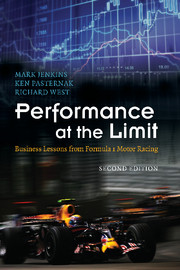Book contents
- Frontmatter
- Contents
- List of figures
- List of tables
- List of plates
- Acknowledgements
- Note on the reference system
- The Grand Prix experience
- 1 Introduction
- 2 Why Formula 1 motor racing?
- 3 The performance framework
- 4 The war for talent
- 5 Winning through teamwork
- 6 Capability through partnerships
- 7 The high-performance organisation
- 8 Integrating
- 9 Innovating
- 10 Transforming
- 11 Achieving and sustaining performance
- 12 Twelve business lessons from Formula 1 motor racing
- Appendix A Grand Prix Champions 1950–2008
- Appendix B Grand Prix Graveyard 1950–2008
- Appendix C Interview respondents
- References
- Index
- Plate section 1
- Plate section 2
11 - Achieving and sustaining performance
Published online by Cambridge University Press: 05 August 2013
- Frontmatter
- Contents
- List of figures
- List of tables
- List of plates
- Acknowledgements
- Note on the reference system
- The Grand Prix experience
- 1 Introduction
- 2 Why Formula 1 motor racing?
- 3 The performance framework
- 4 The war for talent
- 5 Winning through teamwork
- 6 Capability through partnerships
- 7 The high-performance organisation
- 8 Integrating
- 9 Innovating
- 10 Transforming
- 11 Achieving and sustaining performance
- 12 Twelve business lessons from Formula 1 motor racing
- Appendix A Grand Prix Champions 1950–2008
- Appendix B Grand Prix Graveyard 1950–2008
- Appendix C Interview respondents
- References
- Index
- Plate section 1
- Plate section 2
Summary
It’s difficult when you’re winning to keep the team at the top, because if you’re winning you can get a bit arrogant. But it’s also difficult when you’re losing and what you need to do is change.
Flavio Briatore, Managing Director, Renault F1 TeamThe focus of this book is organisational performance – the nature of performance and how it is achieved ‘at the limit’. Organisational performance relates to the extent to which an organisation achieves its stated objectives. Of course such objectives can be wide-ranging, potentially conflicting and also emphasising the needs of different stakeholders. In business the performance criteria tend to focus on financial variables, such as profitability, cash flow and shareholder value. However, with the development of tools such as the balanced scorecard there is a greater awareness of the need to complement financial performance with other performance criteria such as the delivery of customer needs, the efficiency and effectiveness of internal processes and the ability to learn and grow.
In Formula 1, performance is measured ultimately by winning races and accumulating points in the Drivers’ and Constructors’ Championships. We have also seen that performance is measured in other ways within the team as in their quest for speed and efficiency of a pit stop; or by a team’s partner in terms of an increase in brand recognition.
- Type
- Chapter
- Information
- Performance at the LimitBusiness Lessons from Formula 1 Motor Racing, pp. 211 - 222Publisher: Cambridge University PressPrint publication year: 2009



